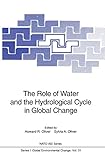The role of water and the hydrological cycle in global change [Libro electrónico] / editores: Howard R. Oliver, Sylvia A. Oliver
Oliver, Howard R [editor] | Oliver, Sylvia A [editor/a].
Tipo de material: Libro
en línea Series Editor: New York, New York, United States: Springer-Verlag, c1995Descripción: viii, 468 páginas : ilustraciones ; 24 centímetros.ISBN: 3540594299; 9783642798320 (Print); 9783642798306 (Online).Tema(s): Climatic changes | Climatology -- Mathematical models | Water balance (Hydrology) | Water resources developmentNota de acceso: Disponible para usuarios de ECOSUR con su clave de acceso Nota de bibliografía: Incluye bibliografía e índice: páginas 463-468 Número de sistema: 56237Contenidos:Mostrar
Resumen:
Libro
en línea Series Editor: New York, New York, United States: Springer-Verlag, c1995Descripción: viii, 468 páginas : ilustraciones ; 24 centímetros.ISBN: 3540594299; 9783642798320 (Print); 9783642798306 (Online).Tema(s): Climatic changes | Climatology -- Mathematical models | Water balance (Hydrology) | Water resources developmentNota de acceso: Disponible para usuarios de ECOSUR con su clave de acceso Nota de bibliografía: Incluye bibliografía e índice: páginas 463-468 Número de sistema: 56237Contenidos:Mostrar
Resumen:| Tipo de ítem | Biblioteca actual | Colección | Signatura | Estado | Fecha de vencimiento | Código de barras |
|---|---|---|---|---|---|---|
| Libros | Biblioteca Electrónica Recursos en línea (RE) | Acervo General | Recurso digital | ECO400562375130 |
Incluye bibliografía e índice: páginas 463-468
1. The role of water in global environmental change processes.. 2. Evaluating the terrestrial water balance from the historical climate record.. 3. Hydrology in climate models and effects on climate.. 4. Plant control on evapotranspiration: models and measurements.. 5. Soil - vegetation - atmosphere relations: process and prospect.. 6. Effects of co2-fertilization on evapotranspiration.. 7. Snow and ice cover and climate sensitivity.. 8. The role of the atmosphere in the water cycle.. 9. Laurentian great lakes dynamics, climate, and response to change.. 10. Modeling of runoff and streamflow at regional to global scales.. 11. New trends in modelling soil processes from hillslope to GCM scales.. 12. River runoff data for the validation of climate simulation models.. 13. Introduction to climate impact assessment.. 14. Scenarios for hydrological climate change impact studies.. 15. Potential changes to hydrological systems.. 16. Socio-economic impacts of changes in water resources due to global warming.. Index
Disponible para usuarios de ECOSUR con su clave de acceso
Water is an extremely important factor in global environmental change. Water influences the processes causing change. The human and economic consequences of changes in the water system can be very significant. The aim of this NATO Advanced Study Institute was to present a state-of-the-art assessment of the role of water in global change, ranging from a consideration of atmospheric processes to the social and political impacts of changes in water resources. Many initiatives have recently been developed, such as international conferences and research programmes in particular themes, but there was still a need for information from these diverse activities to be brought together. One of the aims of the ASI was to encourage cross-fertilization between the various disciplines looking at water in the global system. This book contains the expanded written versions of the lectures presented during the AS! held in Italy in May/June 1994. It falls into two basic parts. The first twelve chapters cover the role of water in the climate system and climate modelling. Various areas of the water balance including global budgets, the effect of each element of the water balance on regional and global climates, and procedures used to model hydrological processes at all scales are discussed. Precipitation, ice, lake, groundwater, land surface and atmospheric considerations are included together with hydrological process linkage to climate models. Ocean effects were not covered as they were considered to be outside the scope of this particular AS!. eng
Disponible en línea
Disponible en formato PDF
Subscripción a ELSEVIER 26 de diciembre del 2013
